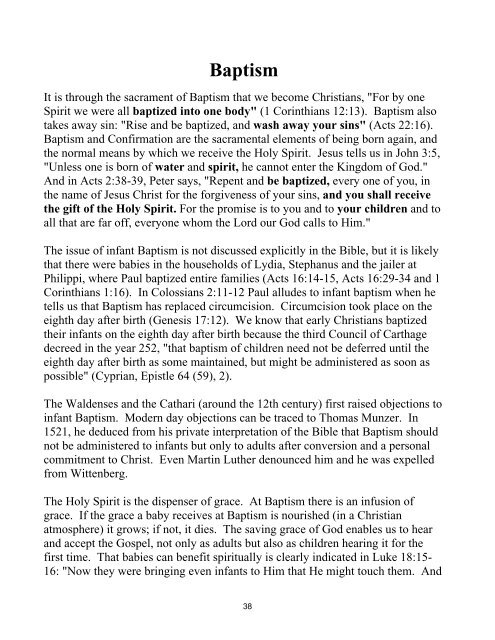Sebastian R. Fama - St. Patrick's Basilica
Sebastian R. Fama - St. Patrick's Basilica
Sebastian R. Fama - St. Patrick's Basilica
You also want an ePaper? Increase the reach of your titles
YUMPU automatically turns print PDFs into web optimized ePapers that Google loves.
Baptism<br />
It is through the sacrament of Baptism that we become Christians, "For by one<br />
Spirit we were all baptized into one body" (1 Corinthians 12:13). Baptism also<br />
takes away sin: "Rise and be baptized, and wash away your sins" (Acts 22:16).<br />
Baptism and Confirmation are the sacramental elements of being born again, and<br />
the normal means by which we receive the Holy Spirit. Jesus tells us in John 3:5,<br />
"Unless one is born of water and spirit, he cannot enter the Kingdom of God."<br />
And in Acts 2:38-39, Peter says, "Repent and be baptized, every one of you, in<br />
the name of Jesus Christ for the forgiveness of your sins, and you shall receive<br />
the gift of the Holy Spirit. For the promise is to you and to your children and to<br />
all that are far off, everyone whom the Lord our God calls to Him."<br />
The issue of infant Baptism is not discussed explicitly in the Bible, but it is likely<br />
that there were babies in the households of Lydia, <strong>St</strong>ephanus and the jailer at<br />
Philippi, where Paul baptized entire families (Acts 16:14-15, Acts 16:29-34 and 1<br />
Corinthians 1:16). In Colossians 2:11-12 Paul alludes to infant baptism when he<br />
tells us that Baptism has replaced circumcision. Circumcision took place on the<br />
eighth day after birth (Genesis 17:12). We know that early Christians baptized<br />
their infants on the eighth day after birth because the third Council of Carthage<br />
decreed in the year 252, "that baptism of children need not be deferred until the<br />
eighth day after birth as some maintained, but might be administered as soon as<br />
possible" (Cyprian, Epistle 64 (59), 2).<br />
The Waldenses and the Cathari (around the 12th century) first raised objections to<br />
infant Baptism. Modern day objections can be traced to Thomas Munzer. In<br />
1521, he deduced from his private interpretation of the Bible that Baptism should<br />
not be administered to infants but only to adults after conversion and a personal<br />
commitment to Christ. Even Martin Luther denounced him and he was expelled<br />
from Wittenberg.<br />
The Holy Spirit is the dispenser of grace. At Baptism there is an infusion of<br />
grace. If the grace a baby receives at Baptism is nourished (in a Christian<br />
atmosphere) it grows; if not, it dies. The saving grace of God enables us to hear<br />
and accept the Gospel, not only as adults but also as children hearing it for the<br />
first time. That babies can benefit spiritually is clearly indicated in Luke 18:15-<br />
16: "Now they were bringing even infants to Him that He might touch them. And<br />
38






